- Home
- David Downing
Lehrter Station Page 18
Lehrter Station Read online
Page 18
‘I saw her,’ Kuzorra said unexpectedly. ‘Not long after you escaped – just after the New Year, I think. I was walking down Neue Königstrasse, and this young woman was walking in the opposite direction. I looked at her photograph often enough when I was questioning people at Silesian Station. I’m sure it was her. She had a baby in a pram.’
‘A baby?’
‘A baby, a small child – I didn’t get a good look. The mother looked happy, I remember that. She hurried on past when she saw me staring at her, which was no great surprise. She wasn’t wearing a star, but of course I knew she was a Jew.’
The French lieutenant reappeared, and indicated that their time was up.
‘I’ll do what I can,’ Russell told the detective.
‘Be careful with Geruschke. I was nowhere near nailing the bastard and he got me locked up – I dread to think what would happen to anyone who really threatened him.’
‘I’ll bear it mind.’
When Russell asked his French escort how long Kuzorra would be held, he got only a Gallic shrug in return. Back at the office, the major had disappeared, and the duty officer might as well have. This particular investigation was not yet complete, he said. If Monsieur Russell wished to testify on the prisoner’s behalf, he should leave his address, and someone would be in touch.
With Kuzorra’s warning still fresh in his mind, Monsieur Russell declined to leave his address. If the detective was right, the only people who could get him released were the people who had got him locked him up – the Americans. Russell would be waiting at Dallin’s door when he arrived on Monday morning.
In the meantime, he had news of Miriam. News that was four years old, but four was better than six. In September 1939 she’d been in terrible shape, and here she was more than two years later with a baby in a pram. And ‘looking happy’. She must have found somewhere safe to live, at least until then. So why not the four years that followed? It still felt unlikely, but less so than it had.
Darkness was beginning to fall by the time he reached Wittenau Station. They were dining at Ali’s again, but he still had time to visit Gregor Jentzsch. After changing trains at Gesundbrunnen, he took the Ringbahn to Wedding and walked the short distance to Gerichtstrasse.
The street seemed more intact than most. The man who answered the door was around thirty, with short blond hair, gold-rimmed glasses and a boyish face. Hearing the name Kuzorra made him wary, but he agreed to give Russell a few minutes. In the living room his equally blonde wife was sitting on the sofa, cradling a blonde baby. Goebbels would have thought himself in heaven.
Jentzsch was clearly fond of Kuzorra, and seemed more than willing to talk, but Russell could tell from his frequent glances at wife and child that the young policeman had no intention of putting his family at risk.
He and other colleagues had been told of Kuzorra’s arrest, and were warned not to involve themselves without specific instructions from the occupation authorities. Their superiors were doing what they could to secure the detective’s release.
‘Kuzorra thinks that Rudolf Geruschke has set him up.’
‘I’m sure he did.’
‘Do your superiors think so?’
‘I don’t know. But we were told to suspend the investigation, at least for the time being.’
‘What about the man who denounced him, Martin Ossietsky?’
‘He works for Geruschke.’
‘At the Honey Trap?’
‘No. He’s in charge of a warehouse out in Spandau. Geruschke brings a lot of goods into the city, and that’s one of his storage depots. There are several others.’
Russell thought for a moment. ‘I could confront Ossietsky. As a journalist, I mean. He might give something away.’
Jentzsch shook his head. ‘He won’t. And you’d be putting yourself in real danger. Geruschke doesn’t like people prying into his business.’
‘What could he do – kill me?’
‘He might.’
‘He didn’t kill Kuzorra, just moved him out of the way.’
‘He’s not a psychopath – he doesn’t go around killing people for the fun of it. But people who oppose him have turned up dead. Always in circumstances where someone else could be blamed, but that’s not hard to arrange, not these days. At least twenty violent deaths are recorded each day across the city, and that’s only in the British, French and American zones. The Soviets don’t keep records of the ones they bury.’
‘So what can I do to help Kuzorra? Do you know anyone in the French administration who would talk to me?’
‘Not really. There’s a major I deal with sometimes. He seems a reasonable man, but I don’t think he works in the right section.’
‘What’s his name?’
‘Jean-Pierre Giraud.’
‘Okay. So what have you and your colleagues been doing? Or have you just washed your hands of Kuzorra?’
‘Not quite,’ Jentzsch said with commendable honesty. ‘I keep asking the bosses, just to let them know that we haven’t forgotten him. I think our best hope is that they let him retire.’
‘Which would mean dropping the investigation.’
‘It’s already been dropped.’
‘But would Kuzorra let it lie?’
Jentzsch sighed. ‘Probably not.’
* * *
Russell was an hour late arriving at Ali’s, but dinner was still cooking. He was about to tell Effi about Miriam when she announced some news of her own. ‘You know you thought Wilhelm Isendahl was too cocky to survive the war?’
‘Yes.’ When Russell had first met Isendahl in 1939, the blond young Jew had enjoyed dining in restaurants patronised by the SS. He and his gentile wife Freya had helped them rescue Miriam and the other girls from the house on Eisenacher Strasse.
‘Well, Ali’s found him. And he’s here in Berlin.’
‘I don’t believe it. That’s great.’ Isendahl had found four families to shelter the rescued girls, but had, at the time, told no one else who they were. But now he could tell them who had taken Miriam. And if any members of the family had survived, they might know what had happened to her, or even where she was.
‘What about Freya?’ he asked.
‘Someone told me that she was in America when Pearl Harbour was attacked,’ Ali said. ‘She may be back now. I don’t know. Anyway, here’s his address.’
Russell pocketed the piece of paper, thinking he could go there next day. ‘I saw Uwe Kuzorra today,’ he announced. ‘He’s the detective we hired to find Miriam in 1939,’ he explained to Ali and Fritz.
‘The one who helped you escape in 1941,’ Ali added for her husband’s benefit.
‘The same. Anyway, he swears he saw Miriam early in 1942. Recognised her from the photograph I gave him. She was walking down Neue Königstrasse with a baby in a pram.’
‘A baby,’ Effi echoed. ‘How old was it?’
‘Kuzorra couldn’t tell.’
Effi did a quick calculation. ‘If the child was less than eighteen months old, then the father was someone she met after we rescued her. But if it was older than that…’
‘Then the father was one of those SS bastards who visited the house on Eisenacher Strasse,’ Russell said, completing the unwelcome thought. ‘Kuzorra thought she looked happy,’ he added in mitigation.
‘Motherhood can do that,’ Effi told him. ‘It makes no difference who the father is.’
* * *
Sunday morning, Effi and Russell went their separate ways. Annaliese expressed disappointment that Russell wouldn’t be sharing their walk, but he suspected she was being polite, and set out for Friedrichshain with a clear conscience.
Isendahl had lived there in 1939, and Russell found himself wondering whether the man had managed to bluff his way through the entire war without even moving apartments. It seemed unlikely – by the end of the war, few adult males of any race had been able to evade the call of the state – but he wouldn’t have put it past him. As it turned out, this apartment was two
streets away from the old one, which he and Effi had visited in 1939. Isendahl lived alone in two large rooms, with a panoramic view across the ruins.
His blond hair was longer than Russell remembered, and the old resemblance to Hitler’s security chief Reinhard Heydrich was less marked. ‘We Victims of Fascism are doing well,’ he told Russell, as he ushered him into the spacious book-lined living room. It had taken Isendahl a few seconds to recognise his visitor, but he seemed genuinely pleased to see him. Wilhelm was still a young man; he’d been a prominent member of the KPD youth wing when Hitler first came to power, so he couldn’t be much more than thirty.
What a way to spend your twenties, Russell thought. But then he’d spent most of his own following Lenin’s illusory star.
Isendahl reclaimed the bottle of beer that stood beside his typewriter, and opened one for his guest. After filling each other in on their respective wars – Isendahl had, in his own words, ‘settled for mere survival’ in 1943, and spent almost two years cooped up in a comrade’s roof-space – Russell asked what his host was doing now. Isendahl was happy to tell him, or at least to keep talking, but his answers were somewhat vague. He was working for a local Jewish group which helped survivors get where they wanted to go. He was also liaising with the Soviet occupation authorities, but in what capacity and on whose behalf was less than clear. When Russell asked after his wife Freya, Isendahl looked uncharacteristically sheepish, and mumbled something about this not seeming the right time to send for her. A further question elicited a reluctant admission that she’d been living in New York with her parents since 1941.
Back in 1939, Isendahl had scorned the notion of a Jewish homeland in Palestine – ‘you don’t fight race hatred by creating states based on race’ Russell remembered him saying – but the six years since had modified his stance. Now he was keen to stress the distinction between right and leftwing Zionists, rather than condemn Zionism per se. Without being asked, he rattled off a long list of different groups, ending, somewhat dramatically, with one called the Nokmim, or Jewish Avengers. These followers of a Lithuanian partisan named Abba Kovner were, as their name suggested, determined on vengeance. They believed that six million Nazi deaths were necessary before the Jewish survivors could learn to live with themselves.
Isendahl smiled at the conceit. His view of the Nokmim seemed a mix of amusement and awe.
Russell had never heard of the group, but he recognised the makings of a story. He asked Isendahl if he was in contact with them.
He wasn’t, but he promised to ask around. He was thinking of becoming a journalist himself – or a writer of some sort – once Europe was put back together.
‘Do you remember Miriam Rosenfeld?’ Russell asked abruptly.
‘The mute one.’
‘Do you know what happened to her?’
‘Not in the end, no.’
‘Did she get better?’
‘Yes, she did. I remember now – she had a baby, and that changed everything. Or so I heard.’
‘Did she stay with the same family?’
‘The Wildens? Yes, but later they were killed in the bombing. Someone told me that Miriam hadn’t been hurt, but I don’t know what happened to her after that – we all got more isolated as the war went on. But I can ask around.’
‘Thanks. I don’t suppose you know any Otto Pappenheims?’ He explained about Rosa, and their search for her father.
‘I do know one Otto Pappenheim. Not well – I only met him once.’
‘When was this? How old would he be now?’
‘I only met him a few weeks ago. I should think he’s about thirty-five.’
‘Did he ever have a wife and daughter?’
‘I’ve no idea.’
‘How would I find him?’
‘Good question. He’s not in Berlin, anymore. He and a friend of mine went off to Poland last month. They’re on their way to Palestine.’
‘Through Poland?’
‘The road begins there, in Silesia. Do you know about this?’
Russell shook his head. He had assumed that Palestine-bound Jews were following well-beaten paths, but had seen no reports of their actual location.
‘A group called Brichah started organising things in Poland,’ Isendahl explained. ‘Then the Haganah – the army of the Palestinian Jews – did the same at their end, and eventually the two of them met in the middle. There are people right along the route now, in Czechoslovakia and Austria, across the mountains and down through Italy to the ports and the ships. The ships that the British try to intercept and send back.’ He noticed the gleam in Russell’s eyes. ‘Another good story, yes? And I am in contact with these people. I could arrange a meeting if you want. They won’t talk to many Western journalists, but I think they would talk to you.’
‘I’d like that,’ Russell admitted. It did sound like a great story, and he might get news of this third Otto Pappenheim.
* * *
Walking in the Grunewald was like walking through the past. Some damage had been done by stray bombs or shells, but nature was rapidly repairing all but the deepest scars, and the smell of the pines reminded Effi of Sunday strolls before the war. It was only when they reached the Kaiser-Wilhelm-Turm, and looked back across the treetops at the lacerated skyline in the distance, that the present again became real.
It was a cold day, and seemed to get colder as Annaliese told her story.
‘When I was picked up by American soldiers I felt really pleased with myself. I’d done it – I’d got away from the Russians. The GIs were pretty free with their suggestions, but the ones I met took no for an answer – I wasn’t raped, and neither were any of the other women I came across during those first few days. I was put on a truck with other refugees and some soldiers they’d found hiding in a village, and we were driven west. We were told that there were camps waiting for us, which sounded a little ominous, but just letting us loose didn’t sound so wonderful either – there had to be some sort of organisation, and we thought that was why they were keeping us together.
Annaliese shook her head. ‘We couldn’t have been more wrong. The camp was called Rheinberg – it can’t have been far from the river – and it was hell on earth. You wouldn’t believe how bad it was. There were thousands of us: mostly men, but families as well, and far too many children. When we got there it was just a huge field surrounded by barbed wire – there were no buildings, no tents, no shelter of any kind. And there was hardly any food. Teething troubles, I thought, but things got worse rather than better. Any food that arrived was rotten, and there was hardly any water. Before too long we were eating grass, and getting sick.’
‘People started digging holes for shelter – the soil was sandy so it wasn’t too hard – but the walls would collapse and those inside were covered in sand, and too weak to fight their way out. Almost everyone had dysentery, and the toilets were just poles strung across pits. People who didn’t have the strength to hold on would fall in and drown.’
‘Did the people higher up know about this?’ Effi asked. ‘Was it just this one camp?’
Annaliese shook her head. ‘I don’t know who knew, but it wasn’t just Rheinberg. I’ve met people since from several other camps, and they all sounded much the same. It was policy – it had to be. How should I say this? The guards didn’t beat people up or torture them with irons – they just killed them with neglect. We found out later that there was enough food and water – but they’d deliberately withheld it. During the weeks the Americans were in charge about a hundred bodies a day were carried out. They stacked them in quicklime outside the fence.
‘There were a few doctors in the camp, and several nurses like me. We did what we could, but it wasn’t much. We were all so weak ourselves. I’m still thinner than I was in the Bunker last spring.’
‘How did you get out?’
‘The camp was in the British zone, and in June the Americans handed it over. The British couldn’t believe what they found, and some of their officers talke
d to the press, but it was all hushed up. One officer told me that a few dead Germans weren’t worth a big row with the Americans, not with the Russians to worry about.’
‘I expected better of the Americans,’ Effi said.
‘So did I. But most of them seem so angry. When the British arrived they were much more sympathetic – they seem to get it that we weren’t all Nazis. The Americans hate us, or at least a lot of them do. The ones at Rheinberg blamed every last one of us for the war, and all the horrors that were done in our name. And they were quite prepared to let us all die.’
They were both silent for a few moments, listening to the breeze stirring the pines. ‘Why did you come back here?’ Effi eventually asked.
Annaliese smiled. ‘I missed the place. And I felt guilty about leaving Gerd’s parents to fend for themselves. I persuaded the British to let me go – one officer took a bit of a shine to me, I think – and I managed to get on a train. What a journey that was! I’ve never seen anything like it – every place we stopped there were other trains full of people, and huge camps by the side of the tracks, with everyone hungry and begging for food. It felt like the whole world was on the move.
‘It took me four days to get here. I needn’t have worried about Gerd’s parents – their staying was a damn sight more sensible than my going. They were surprised to see me, but pleased, I think. And I got my old job back. I took a trip in to the Elisabeth Hospital, partly to see if it was still there, and hoping to find old friends if it was. And of course they were short-staffed.’
‘But you’re a sister now.’
‘Impressive, isn’t it? The pay’s better too, or would be if the money ever showed up. And if you could buy anything with it. But it’s all so frustrating, Effi. Without medicines, we’re just a half-wrecked hotel with nurses. We know the medicine’s out there, but most of the time we can’t afford it. I ask you, what sort of bastard wants to get rich on the backs of dying children? After all we’ve been through, it’s still pieces of shit like that who are running things. Why don’t the occupation authorities do something about it?’
‘I think you already answered that – because, consciously or not, they want to see us suffer. And because they’re up to their ears in shit themselves.’

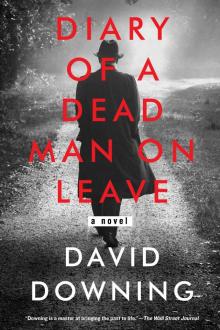 Diary of a Dead Man on Leave
Diary of a Dead Man on Leave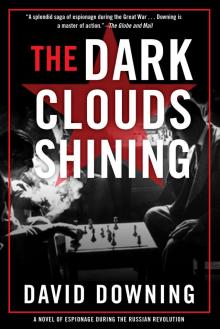 The Dark Clouds Shining
The Dark Clouds Shining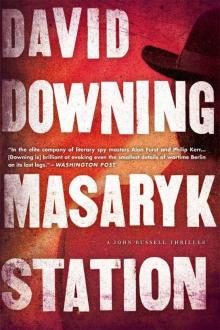 Masaryk Station (John Russell)
Masaryk Station (John Russell)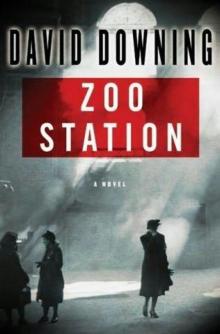 Zoo Stationee
Zoo Stationee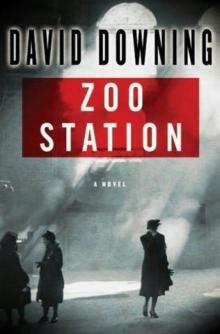 Zoo Station jr-1
Zoo Station jr-1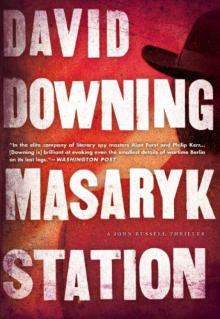 Masaryk Station
Masaryk Station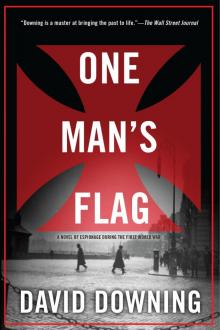 One Man's Flag
One Man's Flag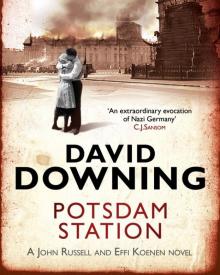 Potsdam Station jr-4
Potsdam Station jr-4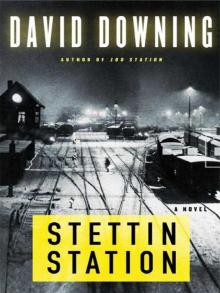 Stattin Station jr-3
Stattin Station jr-3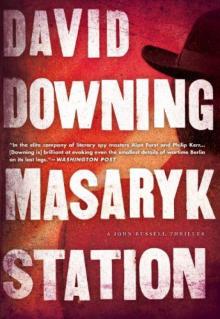 Masaryk Station jr-6
Masaryk Station jr-6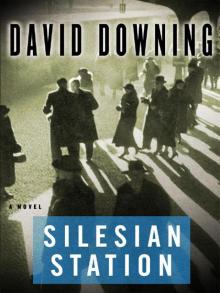 Silesian Station (2008) jr-2
Silesian Station (2008) jr-2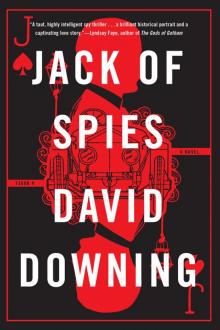 Jack of Spies
Jack of Spies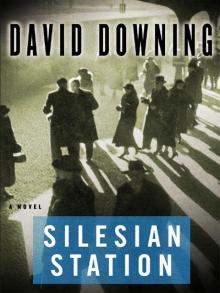 Silesian Station (2008)
Silesian Station (2008) The Moscow Option
The Moscow Option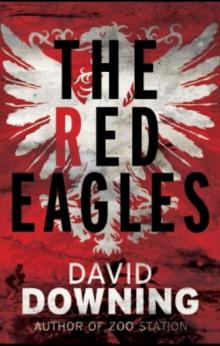 The Red Eagles
The Red Eagles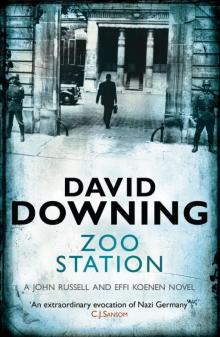 Zoo Station
Zoo Station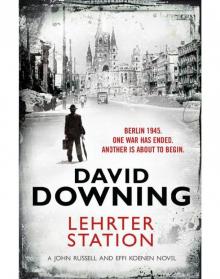 Lehrter Station
Lehrter Station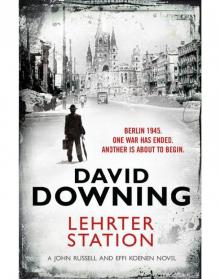 Lehrter Station jr-5
Lehrter Station jr-5